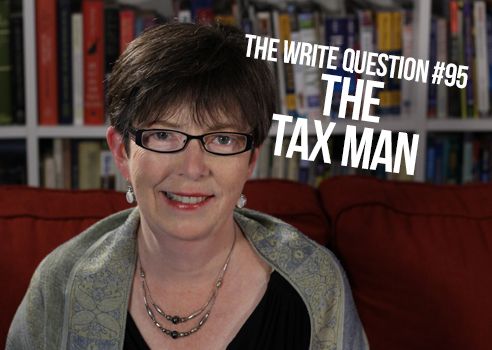Viewing time: 5 mins. 45 secs.
The Write Question is a weekly video podcast about writing that I started in 2017 and that ran, more or less weekly, until April 2022. This is a republication of issue #95, which addresses how to prepare for the tax person. The post first ran on June 14/19.
Transcript:
Welcome to The Write Question, I’m Daphne Gray-Grant and my topic today is how freelance writers can better manage their bookkeeping.
I have an email from Yassmin Manauchehri — a successful freelance translator, and writer based in California. Here’s what she’s asked:
“Every year, I scramble to do my taxes. When I finally finished this year, I felt as though I’d just run a marathon. All I had was receipts stuffed in an accordion binder and it took me a long time to finish. Do you have any suggestions for a better system?”
Thanks for your question, Yassmin. I know the deadline for taxes was April 15 in the US — April 30 in Canada — but now is the time to get your house in order for next year.
I do have a slightly better system. But if it’s any comfort, I myself struggled for more than 15 years with the same type of accordion binder so I can really empathise. I’ve always disliked all the work in calculating how much I have to pay…. Until the last few years.
Here’s why income tax no longer bothers me.
There are just two categories you need to think about when it comes to tax: income and expenses. I found income accounting a lot easier to manage and I developed a good system for that side of the equation, almost from my first day in business.
First, I have separate income folder set up on my computer, and inside of that I create a new folder for every calendar year. I just use Microsoft Word but there’s lots of accounting software out there and one of these days I’ll get around to using that. QuickBooks, link below, is one such piece of software.
Under Income, I bill once a month, usually on the first day of the month. Depending on your business, you may want — or need — to bill more often than monthly, but at the very least, review your billing at least once a month, to be certain you’re not overlooking anything.
Then, each time you create a new bill, name the file, beginning with a number. This is important because Microsoft Word will then file those numbers in precise chronological order. My first invoice for 2019, for instance is labelled: 19-dash-001. My second, is 19-dash-002, etc. etc.
Once I’ve done the billing, I immediately enter it into an Excel spreadsheet. This allows me to easily track how much I’m earning over the year — at any point in time — and it gives me a single sheet I can hand over to my accountant.
It took me much longer to figure out how to deal with Expenses. Part of the issue for me is that the Canadian gov’t requires actual receipts — not just credit card statements. I have a separate business credit card and I use it only for all of my credit card expenses. I don’t know if the system is the same in the US, but you should investigate whether you need receipts or if the credit card statement is enough.
Anyway, for many years, I would always become extra stressed at tax time, desperately looking for missing receipts. My new system makes my life so much easier.
Whenever I get a new receipt, I immediately tape it to an 8.5 x 11 piece of paper and I file it in an alphabetized binder. Then, once a month, when my credit card statement comes in, I’m able to look up each receipt really easily and move it to my tax binder.
Having a good system for saving and being able to find my receipts, and cross-referencing them once a month makes my life so much easier at tax time.
One other point I’ll mention. Many of my receipts arrive via email. I have trained myself to print them out right away and enter them into my binder. This way, I almost never have any missing receipts any more.
As I’m describing my system, it occurs to me that I’m likely creating some unnecessary work for myself with all this copying and filing. So, thanks for asking your question Yassmin. As a result, I’m going to resolve to look into some receipt scanning software for next year’s tax return.
I already have an excellent scanner — it’s called the Fujitsu Scansnap, link below. It cost about $350 and it scans so quickly it was worth every penny. I use it for many reasons just about every day. You might think about getting one of those, too.
Finally, let me wrap up with a quote from the late American author and Pulitzer prize winner Herman Wouk. He won the 1951 Pulitzer Prize for fiction for his book The Caine Mutiny, link below: “Income tax returns are the most imaginative fiction being written today.”
Yassmin, don’t allow your income tax returns to approach the “fiction” side of the leger. If you develop a good system, and devote a small amount of time to it each week, you will prepare for the tax person and then income tax season will no longer be a time of year that you dread.


